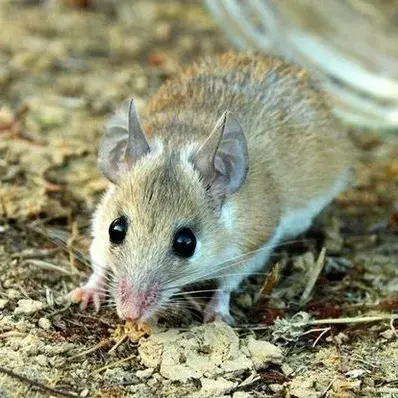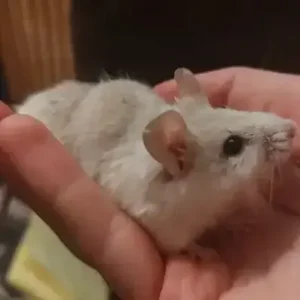Spiny Mouse Origin
Originating in Africa and the Middle East, spiny mice have been companions to humans for centuries. They were initially kept for their interesting appearance and later recognized as charming pets. The African Spiny Mice have also been used as laboratory mice, especially due to their remarkable ability to regenerate their skin, hair, and cartilage, and heal wounds after an injury.
Personality
Spiny mice are known for their curious and social nature. They form strong bonds with their owners and enjoy interaction. Moreover, these little creatures can learn to solve problems and adapt to new situations. They can also recognize and remember individual humans, which makes them amazing as pets.
Physical Appearance
They are called spiny mice due to their little spiny hair. Apart from this distinction, they look just like a common house mouse. Spiny mouse tails are bald, and about as long as their bodies.
- Size
Small and compact, ranging from 3 to 5 inches in length.
- Coat Color
Their fur comes in various shades of brown and gray, creating a striking spiky appearance.
Gender Differences
Both male and female spiny mice share similar characteristics. Both males and females reach sexual maturity in 6 to 9 weeks. The gestation period of a spiny mouse is between 38 and 42 days before producing a litter. Moreover, a sub-species of the Spiny Mouse, the female Cairo Spiny Mouse menstruate, making it valuable for research.
If you are planning to keep a pair of Spiny Mice, you need to provide ample space for more mice, as the females can conceive throughout the year. Apart from this specific consideration, both males and females require similar grooming and care.
Feed/Nutrition
A diet rich in seeds, nuts, fruits, and vegetables keeps spiny mice healthy.
Here are the main elements of a Spiny Mouse’s diet
- Mouse Pellets: Offer a well-balanced diet consisting of high-quality rodent pellets. These pellets ensure your spiny mouse receives essential nutrients.
- Seeds and Nuts: Integrate a variety of seeds and nuts into their diet. Sunflower seeds, pumpkin seeds, and unsalted nuts provide healthy fats and proteins.
- Fresh Fruits and Vegetables: Include fresh fruits and vegetables in their diet for added vitamins and minerals. Apples, carrots, and leafy greens are excellent choices.
- Avoid Processed Foods: Steer clear of processed or sugary foods, as spiny mice are prone to obesity. Stick to natural and unprocessed options to maintain their health.
- Water Supply: Ensure a constant supply of fresh and clean water. Use a small water bottle with a sipper tube to prevent spills and keep the water fresh.
- Small Portions: Provide small, frequent meals to prevent overeating. Monitor their weight and adjust portions accordingly to maintain a healthy balance.
Health
Common health issues for Spiny Mice include dental problems and obesity. Regular veterinary check-ups are important for detecting any health problems before they become deadly.
- Dental Care: Keep an eye on your spiny mouse’s dental health. Their teeth grow continuously, so providing wooden chew toys helps prevent overgrowth and related issues.
- Obesity: Spiny mice are susceptible to obesity, so monitor their weight and adjust their diet accordingly. Ensure they have opportunities for physical activity, such as an exercise wheel.
- Respiratory Health: Maintain a clean and well-ventilated environment. Spiny mice can be sensitive to changes in temperature and may develop respiratory issues if exposed to drafts or extreme temperatures.
- Parasite Infection: Protect your spiny mouse from parasites by keeping their living space clean and providing proper grooming. Consult your veterinarian for appropriate parasite prevention methods.
- Stress Management: Spiny mice are social animals, and stress can impact their health. Provide a secure and stimulating environment, and avoid sudden changes that may cause stress.
- Injury Prevention: Spiny mice are active and agile, so make sure their living space is free from hazards that could lead to injuries. Check for any sharp edges or potential escape routes.
Care and Grooming
Minimal grooming is needed, but providing opportunities for them to burrow and explore is necessary for their well-being.
Here’s what you need to do to ensure proper care:
- Minimal Grooming & Bathing: Spiny mice have relatively low grooming needs. Their fur is self-maintained, and they often groom themselves. Spiny mice often shed their skin. That’s why they don’t require baths. If necessary, use a dust bath designed for small rodents. Ensure the bath is dry and suitable for their delicate skin.
- Provide a Safe Habitat: Create a secure and stimulating environment for your spiny mouse. Ensure their living space has hiding spots, tunnels, and places to explore. This helps satisfy their natural instincts and promotes mental well-being.
- Regular Cleaning Routine: Keep their habitat clean by removing soiled bedding regularly. Use a mild, rodent-safe disinfectant for cleaning. A clean living space minimizes the risk of infections and promotes a healthy environment.
- Enrichment Activities: Keep your spiny mouse entertained with enrichment activities. Offer toys, climbing structures, and items for them to chew on. This helps prevent boredom and encourages physical and mental stimulation.
- Handling with Care: Approach your spiny mouse gently and with patience. They may be a bit skittish, so allow them time to become accustomed to your presence. Use both hands to support their body when picking them up.
Rescue Groups
You can check local animal shelters or small pet rescues for spiny mice in need of a loving home. Moreover, you can also contact these groups to see if they have any Spiny Mice in need of a loving companion.
Spiny Mouse for Sale
Reputable breeders or pet stores may have spiny mice available for purchase. You can check these out as well:
Interesting Facts
- Spiny mice are excellent jumpers and climbers. They need it to espcare several spiny mouse predators, such as foxes and owls.
- They communicate using a combination of vocalizations, body language, and scent marking.
- There are many species of Spiny Mice, including Western Sahara Spiny Mouse, Gray Spiny Mouse, South African Spiny Mouse, and many others.
Best For
Ideal for individuals or families looking for an interactive small pet.
Top Names for Your Spiny Mouse Pet
| Male Spiny Mouse Names | Female Spiny Mouse Names |
| Spike | Willow |
| Sonic | Pebbles |
| Pepper | Cocoa |
| Milo | Tails |
| Oreo | Ginger |









